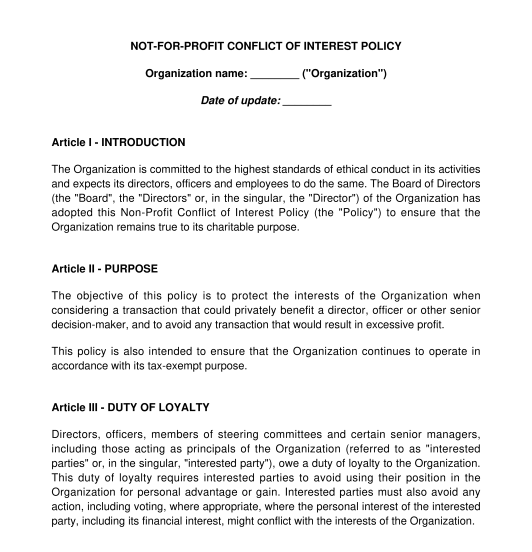 26/01/2025
26/01/2025

Answer a few questions and your document is created automatically.

Your document is ready! You will receive it in Word and PDF formats. You will be able to modify it.

 26/01/2025
26/01/2025
 Word and PDF
Word and PDF
 7 to 10 pages
7 to 10 pages
A conflict of interest policy for a not-for-profit organization is a document used to describe situations that may create a conflict of interest for their board members, officers, directors, managers and key employees. This policy document also describes the procedures to be followed in the event of a disclosed conflict or potential conflict.
Conflicts involve situations where the main actor may be motivated by something other than his or her work for the organization. For example, an officer or director will need to disclose a conflict if they receive payment from another source in a transaction involving the organization.
A conflict of interest policy is a document that applies to an employer's organization that operates with a view to profit. On the other hand, a not-for-profit conflict of interest policy applies to the unique needs of non-profit organizations. These unique needs include a vision that aligns with the non-profit's objectives without financial gain. Both documents seek to ensure that personal interests do not conflict with the interests of the organization, which generally applies to executive members such as the board of directors or senior officers.
A not-for-profit conflict of interest policy should contain information on the organization, the definition of a conflict and how such may arise, disclosure and reporting requirements of potential conflicts, the management of conflicts, and how non-compliance will be addressed.
Once the conflict of interest policy is ready, employees should sign, either electronically or physically, the acknowledgement at the end of the document confirming they read and understand the Conflict of Interest Policy. The employer should then add a copy of the signed Policy to each employee's file.
The employer will then need to continue monitoring situations that give rise to conflicts and appropriately address them.
Not-for-Profit Conflict of Interest Policies are subject to not-for-profit corporate law, which requires that the board of directors or officers disclose, in writing, that a conflict may exist and the extent to which the director or officer may be in conflict. The following pieces of legislation apply to incorporated not-for-profit organizations:
You fill out a form. The document is created before your eyes as you respond to the questions.
At the end, you receive it in Word and PDF formats. You can modify it and reuse it.
Not-for-Profit Conflict of Interest Policy - Template
Country: Canada (English)